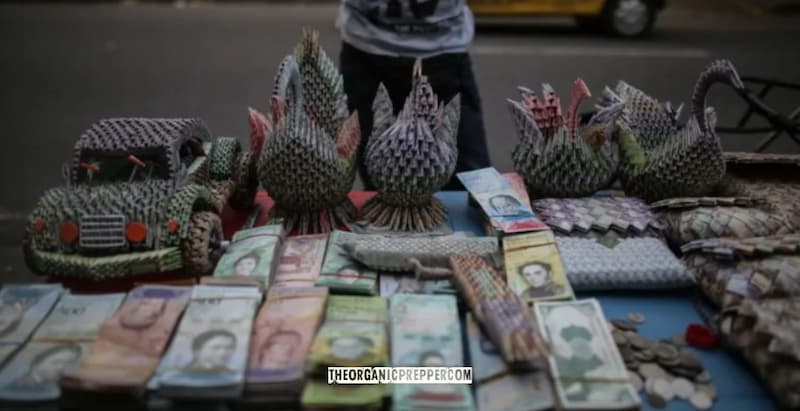() Every Venezuelan has a story of how the nationalization of industry negatively impacted his life. These stories could fill a shelves’ worth of books. We didn’t always have these stories, however. They were forced upon us. We adapted to a post-nationalization world, but it was neither ideal nor desired. But to understand these stories, you first must understand how our economy was before Hugo.
Related Where to Get Food When There Is None in the Stores
One of the most challenging tasks, though, is to get this data. The official institutions and organizations do not present accurate data. The communist world left behind too many ill practices, one of them being the hiding of crucial information. The opacity and silence have been their signatures. Their Iron Curtain mentality still tries to avoid giving any information to the enemy. Of course, their enemy is the common-democracy-believer citizen.
Political crises in your region are coming.
I think there is no way America can escape these crises. The last vestige of freedom in the world is in danger.
If some people believed these red-colored gangs were just OUR problem, I would ask them to reconsider. Don’t be so sure it is only our problem. I have a feeling it is about to be yours too.
It wasn’t too long ago numerous industries thrived in Venezuela.
- The steel industry, integrated from ore extraction, foundry, and refining, to semi-elaborated products in some instances like piping and valve bodies for the oil industry, among many others, and slabs, coils, or bars for posterior processing in other industries.
- Beams for the construction industry, semi-truck and truck parts,
- A vertically integrated aluminum industry, from ore extraction and processing to fully elaborated products.
- Glass industry. Bottles, car parts, building glass.
- Car parts industry: tires, batteries, among the largest ones.
- Oil industry. PDVSA was the 4th oil corporation in the globe from 1999-to 2002.
- Hydropower. Once great, it is now running at maybe 40% of its capacity, with no maintenance in decades. We’re all waiting for a total meltdown. (One of my most accelerated preps)
- Many other industries: paper, canned food, and agriculture, produced more than enough to provide for Venezuelans.
Most of these businesses were running strong and growing in the 90s.
They started to go adrift in the first half of 2010 because of the currency control exchange, and almost NONE of them are working now. By 2005 the panic was already in place. Qualified professionals with international experience in my company (some had worked in CITGO) had already gone looking for other companies like Shell, Chevron, BP, or other big corps.
Most of the workers who belonged to the state-owned companies of steel, hydropower, and aluminum are now (logically) in other countries. However, most of them are not working in their area of expertise. On the contrary, the ways they win bread are usually a type of hand labor.
And a large spectrum of these workers now work in fields including delivery, handcrafting, cab driving, masonry, wall painting, industrial sewing, car mechanics, bike mechanics, some selling candy, soda, homemade cake or pastries on the streets, children’s daycare, and handymen.
This isn’t to say these fields are lesser. But these were our most highly educated and experienced engineers, architects, scientists, and the like. Watching an engineer with national renown become a hot dog vendor on the side of the street is strange, no?
Those with a little more vision and resources rented a place and started selling hamburgers and hotdogs, pizza, and all sorts of fast foods like the famous Venezuelan arepas in the countries where you can get cornmeal. Engineers, architects, MDs without papers, managers, even police officers (very likely to be prosecuted with treason charges if they are caught coming back to the country), firefighters, and lawyers – they all did this.
Many professionals had to work in areas utterly incompatible with their original careers.

Those who wanted to migrate were mostly those without anything to lose in the country. They sold homes and belongings without any regrets, nor without looking back.
Our labor market is now just under 60%, one of the lowest in the region. Most of the jobs are now in the commerce and services sector.
Many others used their hobbies, like cooking, to make a living while they fixed the paperwork to continue their original careers. Others who decided to stay put in Venezuela usually quit their jobs to make more profit in some activities previously mentioned, making more money.
In my case, the Peru Engineers Board asked for a $1200 yearly fee to work in their public companies, which usually have good salaries and pay according to experience and responsibilities. There was no way I could afford to pay that fee.
Private companies pay as little as you are willing to accept, and the government looks to the other side because it is a private agreement. Interestingly, people running their own business where they repaired or re-manufactured some goods were able to stay in business.
In my hometown, a small company rebuilds mattresses, and they are doing well. The owner of the largest rotary lathes and milling machines workshop in town was always running the business more or less as usual. Not even the power cuts affected them because just plugging an old diesel generator that used to belong to a discarded welding machine they had lying in a backyard kept them running during the 3-4 hours weekly power cuts. One twenty liters jerry can of diesel is enough to keep them operating.
(Looking to keep your pantry fully stocked no matter what comes? Check out our free QUICKSTART Guide to building your 3-layer food storage plan.)
The oil industry collapse

One of my best friends is a very experienced specialist in materials engineering. He fell into a severe depression after a crude and poorly managed divorce. That left him almost ruined, without a home, car, or money. Everything else valuable ended up being taken from him after over 15 years of hard work.
He ended up milking cows on a secluded, isolated farm property of a (later) girlfriend’s family, who took him in. Getting an online job as a special consultant for some companies in Colombia helped to get him back on his feet again.
Another of my appreciated former co-workers and colleagues started to teach Salsa dance classes.
Before that, he had some taxis on the streets (kind of an impromptu Uber, but not so organized) that produced a fair amount of money. He was able to buy a second house to rent out to tenants for some passive income and could surf the waves of life relatively intact.
Some of the most common activities for male and female migrants are waiters, hairdressers, nail-dressers, and receptionists, depending on the country they chose. A former girlfriend of mine living in Spain now works remotely in an insurance company. She still runs her tourism agency part-time, though.
However, the most drastic change in the line of work I have heard is from a couple of guys who used to work in a sports clothing shop and ended up working cleaning crime scenes in the USA. Legal cleaning, not the mob service one. LOL.
Many people, professionals or not, have used these methods, no matter if they are still in Venezuela or not:
- Testing multiple forms of bartering.
- Reducing from three to two or one meal a day.
- Reducing the quality, variety, and quantity of food consumed.
- Replace recreational and cultural activities that need money with others that do not.
- Limiting mobility to the minimum necessary
- Limiting or eliminating expenses for footwear and clothing,
- Medicine expenses are subject to the bare minimum.
- Natural healing alternatives are now a much more common practice.
The most successful migrants I have seen were those who planned to keep their businesses in other countries. They planned and did extensive research before they escaped. It’s not as if they had many options either. Not knowing even a couple of words in English limits their qualifications too much to my liking. Many Venezuelans migrated because some fellow told them to come over and they would help.
Guess what?
They suffered a huge disappointment.
Those “fellows” left them stranded in a foreign country bus terminal without even returning the calls. Read several stories about this.
However, one of the most useful readings about the topic I could find in my research was the one compiling some of the wiser analyses I’ve read in my life to come out of a sociologist. He refuses to label the diaspora as a “brain leakage”; he uses the term “talent recirculation” instead.
Maybe he sees something we don’t, and this is not that bad. He may not be that wrong after all. People working on something that love or pleases them, instead of a stressful job that maybe pays well but they hate, are likely to deal much better with the occasional lack of water or grid power. I can understand that.
Saving $200 or $300 a month and dressing in T-shirts, jeans and sports shoes or sandals the whole year for some people, with their family in the same city works for some. Others may love Canadian weather and enjoy giving 50% of their wage to that government while they video-chat with their relatives. That is fine. To each their own. Situations are different for everyone.
(Want uninterrupted access to The Organic Prepper? Check out our paid-subscription newsletter.)
One family’s example
Maria is a former co-worker and a colleague engineer. She was in charge of maintenance and was one of my internal corporative customers. Once our salary inside the industry was reduced to cosmic dust, we quit at the same time. I left for Ecuador, and she and her husband stood still, resisting bravely.
They became involved in people transport, cargo transport, particular classes, and home-cooked meals for those with a job but no time to cook – all to make ends meet. They even tried a business where they bought and took groceries to people who couldn’t leave their – whether this was due to old age or simply not having a car. This worked because our subdivisions were built like many others around the world. Taking into account that fuel and cars would be there forever. Ten more minutes in a ride would mean nothing, but in a world where fuel is incredibly expensive now or scarce, it means a lot.
Maria and her husband charged a fee depending on the amount of the bill. Of course, this worked after the scarcity was finished and with an upfront down payment, with the remaining to be paid upon delivery. Not bad. It worked for them for a while, with fuel being the only variable that made them shut down.
However, the logical step in my book would have been to get rid of both cars using gasoline and get a larger van with a diesel engine. This would allow getting more customers, and diesel was plentiful – not so hard to get as gasoline. However, selling the cars that cost so much to get would mean a serious social status loss.
Yes, some people down here still think in those terms. And changing the kids to a public school is even worse.
Another example comes from a long-time friend from my high school.
He is an electronic technician. His family owns a farm, and he works there part-time with two older brothers. When things are easy in the hacienda, he gets some freelance jobs, like repairing electrical boards and some other electronic components of industrial or farming machinery. I find his life being quite in line with his own needs. He makes good money, and the future of his family is rather secure with the stability of the farm.
It is important to mention that the only cases I have heard or read about ending in tragedy are people who suffered a hard psychological impact. A severe disease, an accident that brought misery to the whole family because the only breadwinner was injured or sick. Things like that. This is part of life, though. Sure, the consequences are much more severe than in standard conditions because of the magnifying effects of the crisis.
No one is exempt from hardship.
We should be aware of that and calculate the odds of that happening. In my former profession, the consequences of something happening were severe, but the odds were not significant. Thinking about miniscule odds and not doing a thing is foolish, though. The approach to life should be a coherent one, even during times of disaster. What I saw in Venezuela was that those who focused on producing a series of solutions, using all of their past experiences, skills, and interests were able to succeed.
I believe you can do the same.
Stay sharp, stay tuned…
…And be safe!
What do you think?
If radical elements in the US have their way, this could be the future. Do you foresee the nationalization of industry happening in America? Does the government’s grab of control of the Abbot baby formula plant foreshadow what is to come? Share your thoughts in the comments.
About The Author
Jose is an upper middle class professional. He is a former worker of the oil state company with a Bachelor’s degree from one of the best national Universities. He has an old but in good shape SUV, a good 150 square meters house in a nice neighborhood, in a small but (formerly) prosperous city with two middle size malls. Jose is a prepper and shares his eyewitness accounts and survival stories from the collapse of his beloved Venezuela. Jose and his younger kid are currently back in Venezuela, after the intention of setting up a new life in another country didn’t go well. The SARSCOV2 re-shaped the labor market and South American economy so he decided to give it a try to homestead in the mountains, and make a living as best as possible. But this time in his own land, and surrounded by family, friends and acquaintances, with all the gear and equipment collected, as the initial plan was.
Stillness in the Storm Editor: Why did we post this?
The news is important to all people because it is where we come to know new things about the world, which leads to the development of more life goals that lead to life wisdom. The news also serves as a social connection tool, as we tend to relate to those who know about and believe the things we do. With the power of an open truth-seeking mind in hand, the individual can grow wise and the collective can prosper.
– Justin
Not sure how to make sense of this? Want to learn how to discern like a pro? Read this essential guide to discernment, analysis of claims, and understanding the truth in a world of deception: 4 Key Steps of Discernment – Advanced Truth-Seeking Tools.
Stillness in the Storm Editor’s note: Did you find a spelling error or grammatical mistake? Send an email to [email protected], with the error and suggested correction, along with the headline and url. Do you think this article needs an update? Or do you just have some feedback? Send us an email at [email protected]. Thank you for reading.
Source:
https://www.theorganicprepper.com/post-nationalization/
Support our work! (Avoid Big Tech PayPal and Patreon)DIRECT DONATION


Leave a Reply